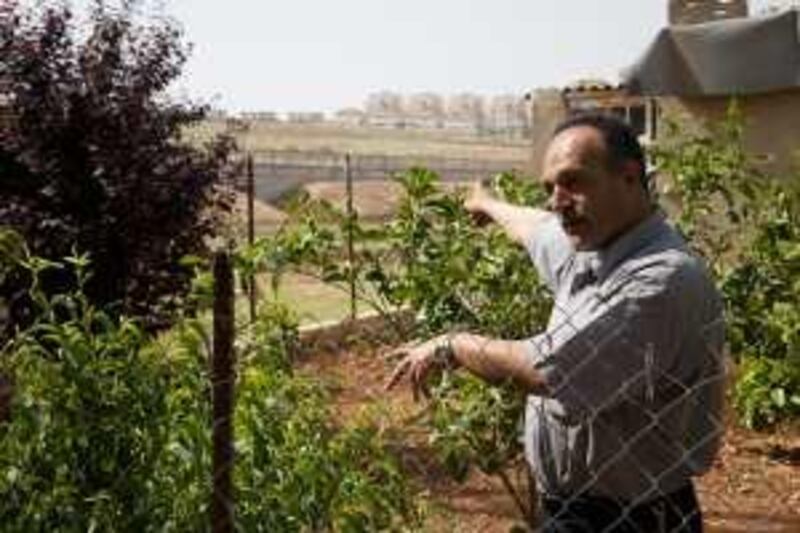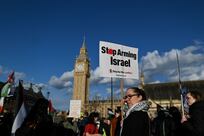RAMALLAH // Every day, when Salah Assaf looks through his binoculars, he expects the worst. The 46-year-old primary school principal keeps as close a watch on what is happening to his olive grove as he can. Situated next to the Givat Zeev settlement, north of Jerusalem and deep into occupied West Bank territory, the olive grove, he said, is in constant danger of being levelled to make room for more housing units. "Settlers have made me several offers to buy the land," Mr Assaf said. "But it's my land, I'm not selling." Nor is he able to go there, however. Not long after the second intifada started in 2000, areas immediately around settlements were declared closed military zones. As a consequence, Palestinian farmers with land adjacent to such settlements were prevented from cultivating it. Mr Asssaf is also prevented from reaching his land by Israel's separation barrier, here a nine-metre high barbed wired, concrete wall, which was completed around Mr Assaf's village of al Jeeb earlier this year. The principal said he was always afraid he would wake up one morning to see his trees gone. For him, the international pressure on Israel to freeze all settlement construction, led by Barack Obama, the US president, has not made any difference so far. "There is never enough land for them [Israelis] and I don't think Obama is serious. The US has always supported Israel, there is no difference now. Different face, same policy." Some observers disagree with Mr Assaf's show-me-and-I'll-believe-it perspective. Yossi Alpher, an Israeli analyst, said it was obvious that international pressure on Israel to end its settlement construction, most recently reiterated by the G8 countries on the sidelines of a meeting in Italy on Friday, was leaving Benjamin Netanyahu, the Israeli prime minister, "squirming". "There is pressure and it has had an effect," said Mr Alpher, a former head of the Jaffee Centre for Strategic Studies in Tel Aviv. "Netanyahu's speech, in which he accepted the two-state solution, is a response to that pressure. His meeting with [US envoy George] Mitchell was cancelled, because Netanyahu has nothing to offer him." Mr Alpher said US pressure was effective because it was sending a signal to Israelis that the current US administration was effectively declaring Israeli officials persona non grata. "Netanyahu is looking for ways to wheedle out of this in all kinds of ways. But if I were sitting in the White House or in the state department, I would see that the pressure was working and that these guys are squirming. They haven't capitulated, but they're squirming." Mr Alpher also said he did not believe it was politically impossible for Mr Netanyahu to cave in to international pressure on the settlement issue in spite of the fact that his own party and several of his coalition partners were adamantly opposed to ending settlement construction, especially for so-called natural growth, or building within existing settlements. With a young coalition, argued Mr Alpher, no one would be keen on early elections. For the time being, however, the Israeli government is continuing to "wheedle". On Friday, Avigdor Lieberman, the Israeli foreign minister, called the Obama administration's demand that Israel stop building in settlements a "mistake". In an interview with Time magazine, Mr Lieberman also said Israel was "trying to formulate some understanding with the US" on the issue. "We don't speak of building new settlements. We don't speak of expansion. We try to build only within existing construction lines," Mr Lieberman said. But "we cannot suffocate our own people. You know, babies are born. People get married. We cannot stop life. People want to build a synagogue or a kindergarten." Certainly on the ground, there has been no discernible change in Israel's settlement policy. In fact, say some activists, settlement activity has grown more aggressive. "We are seeing more activity from both the government and settlers," said Issa Samander, a co-ordinator with the Land Defence General Committees, a grassroots organisation that helps Palestinian farmers appeal land confiscations. Mr Samander pointed to an Israeli government decision last week to grant full settlement status and expand what was formerly a settlement outpost north of Ramallah, as well as a reported increase in the number of caravans being dotted around the West Bank, the usual way for settlers to establish outposts. "We're seeing that Israel is working to legalise old outposts and create new outposts," said Mr Samander, thus putting new "facts on the ground". Israeli law makes a distinction between outposts and settlements, with the former being established without explicit government approval and deemed illegal. International law considers all settlements in occupied territory illegal, along with the presence of some half a million Jewish settlers. And while Mr Samander welcomed the US administration's pressure on Israel to freeze settlement construction, he warned that the issue needed more than words and that the US should not ignore international law when addressing the issue or be lured into negotiating with Israel over settlements. "Settlements are something real. In two months, can the US force Israel to at least remove the outposts, which are illegal even under Israeli law? This is the big question. Palestinians have lost all faith in big words. We need to see some tangible steps." okarmi@thenational.ae
'There is never enough land for them'
Analyst believes US pressure is beginning to have an effect on the Israeli governement but others remain unconvinced.

Editor's picks
More from the national




